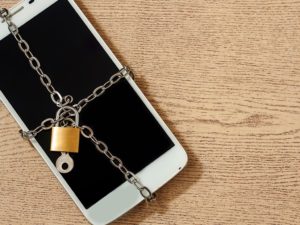
Did you waive your right to legal counsel? Hopefully not. Surely, you’ve watched enough television shows to know how that could put you in jeopardy. By the same token, you might be able to recite some version of the Miranda rights by heart.
- Self-incrimination. Remember that part that “anything you say can and will be held against you?” The words really do have a meaning. There’s really no reason to volunteer information. And, that includes the password allowing the cops to look at every text message, every photograph, every social media post ….and your phone entries.
In the meantime, notice the use of the word “volunteer,” You are under no obligation to unlock your phone. That is unless the police have obtained a warrant. Without your consent and access, they’ll have no other choice but to convince a judge that they have probable cause to search your phone. As far as you’re concerned, it might be counterintuitive for you to give police the password to your cellphone. However, according to a recent court ruling, you must comply with the warrant and provide the numbers that will unlock the device. And, yes – even if you think it all sounds like self-incrimination.
Warrant Calls for Cell Password
According to the drug suspect, Bolo warned him about wiretaps placed on his phone and others in the trafficking network. Bolo also provided other information concerning the police investigation. Since he knew Lowery’s license was suspended, Bolo registered his vehicles in his name. Lowery consented to an electronic search of his cellphone. When the investigating officers researched the number saved for Bolo, they determined that it matched a cellphone registered to one of Andrews’ iPhone telephone numbers.
On the same evening of Lowery’s arrest, Internal Affairs from the Sheriff’s Office met with Robert Andrews. When asked to turn over his cellphones, Andrews complied. However, he did not consent to a search of his phone. Additionally, he refused to give a statement. When Andrews requested the return of his cellphones, the police officers told him they were holding them while they pursued a search warrant.
- Ultimately, an Essex County jury indicted the defendant on six separate counts. Six months later, the State asked the court to grant a motion compelling Andrews to provide the passcodes necessary to unlock his phone.
Justification for the Warrant
Opposition to the Warrant
In opposing the warrant application, Andrews’ attorney argued that he should not be compelled to produce his passwords. Doing so would provide incriminating information, which would violate the defendant’s Fifth Amendment rights against self-incrimination. The argument suggested that his phone records would act as testimony and cause him to be a witness against himself. Upon consideration, the trial court disagreed that the defendant’s rights would be violated if compelled to turn over the passwords. That said, the judge also limited the scope of the warrant. The State could only look at two applications on the phone, namely the phone log and the text message collection.
- The order first mandated the defendant to provide the State with the passcodes. Additionally, the court required the State to search through the phone in front of the judge and defense counsel.
On Appeal
In Andrews, disclosing the passcodes “does not convey any implicit factual assertions about the “existence,” or “authenticity” of the data on the device.” However, “by providing the passcodes, the defendant will not be compelled “to restate, repeat, or affirm the truth of the contents of the” devices.” In further review, the Appellate Court discussed the fact that the defendant was only required to turn over the passcodes, and not the contents of the phone. Providing the passcodes would not provide the State with any information it did not already possess. The bottom line is that the production of passcodes did not represent a violation of the defendant’s Fifth Amendment rights. The State established “probable cause that the devices contained evidence of criminality.” Therefore, the trial court’s decision was affirmed.
Contact Us
CALL NOW: 201-829-3829